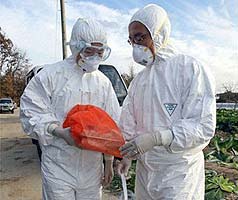Avian influenza outbreaks again in Korea
On Thursday (March 8), a representative of the Korean government confirmed that bird flu has reappeared in the central region of the country, although the Government has tried to control this dangerous virus since the outbreak. first played last month.

Medical experts take specimens for testing (Photo: CNA)
South Korea's Ministry of Agriculture and Forestry announced that bird flu has just been discovered at a livestock farm near Cheonan, about 90km south of Seoul.'Test results confirming farm farms in Hwagye village have been infected with the virus carrying the disease'. However, the information did not say whether it was the H5N1 virus.
The most recent bird flu virus detected in Korea is February 10, in Anseong, 15 km north of Cheonan. Between December 2003 and March 2004, South Korea was affected by bird flu. At that time, more than 5.3 million poultry of this country were killed or destroyed, losses of up to 1 billion USD.
Avian influenza virus has claimed the lives of 150 people around the world since 2003. Currently, public opinion is very concerned about the possibility of this dangerous virus variant, transformed into human-to-human transmission. If so, that would be a disaster for the world.
Thuy Tinh
- South Korea: Detection of H5N8 influenza virus in ducks
- Avian influenza has grown rapidly on a large scale
- Avian influenza virus has changed
- Vaccination against influenza H7N9 initially tested successfully
- Korea: Detection of H5N8 virus in the geese
- South Korea has more cases of bird flu in dogs
- The emergence of new avian influenza virus is potentially lethal
- Strengthen prevention and control of avian influenza
- The strain of avian influenza in Korea differs in Southeast Asia
- Avian influenza outbreaks in Asia
- The risk of a H7N9 outbreak in winter in China
- Vietnam successfully studied influenza A / H5N1 vaccine and influenza A / H1N1
 March 2012: Launching H5N1 vaccine for poultry
March 2012: Launching H5N1 vaccine for poultry Experts comment on the mysterious gradual disappearance of the Delta variant in Japan
Experts comment on the mysterious gradual disappearance of the Delta variant in Japan Danger of the two Delta . branch variants
Danger of the two Delta . branch variants 2020 pandemic flu attack humans?
2020 pandemic flu attack humans?